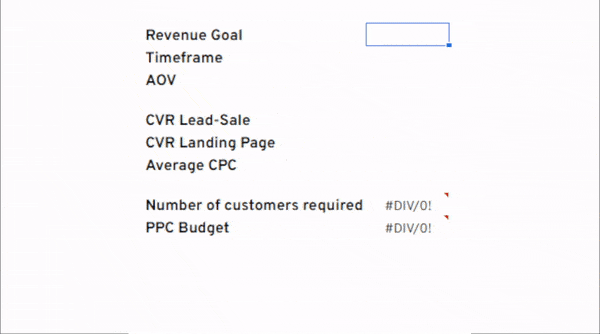How To Calculate Your PPC/Google Ads Budget
What is PPC Budget? How to calculate PPC budget? – We hear you.
Calculating the correct PPC budget can be a difficult task for any organisation. This said, we’ve popped together this post to assist with the oh so strenuous task of calculating your PPC Budget and have even included a calculator to help you in doing so.
Prerequisites: To best make use of this post. Having had a PPC campaign up and running is an essential first step. This gives you the data in which you need in order to make an informed decision. If you haven’t yet set up your campaign, consider running one prior to reading further.
As a small business owner, acquiring new customers is no doubt a high priority for you, and allocating the correct budget to the various tools available in your arsenal is an ever important task when it comes to acquiring these new customers.
If you’re serious about growing your revenue and scaling your business then PPC advertisement along with Search Engine Optimisation are both fantastic methods in which to achieve this.
We often get asked what the difference is between the two digital marketing methods. The main point to note is that SEO is a longer ongoing process and PPC is a fast way to generate enquiries or sales NOW. Both PPC and SEO have their advantages and disadvantages and utilising each will depend on your specific goals, for more on this, check out our post on SEO vs PPC.
Marketing in general is a science as well as an art – being creative is an essential skill when creating Ads, however, being able to measure and adjust in a controlled way is equally as important. This is especially so when you have all the data digital marketing gives you.
When it comes to PPC, you may find yourself scratching your head asking yourself where to start and wondering how to calculate your Google Ads budget?
To calculate your budget, it is important to firstly know your numbers and understand your goals.
Knowing Your Numbers – Metrics
Before we can calculate your budget, we need to understand the following;
- CVR (Conversion Rate) – PPC Campaign
- CPC (Cost Per Click)
- CVR (Conversion Rate) – Lead to Sale
- Average Order Value (AOV)
We have an entire post covering Digital Marketing Jargon but let’s take a look at the relevant metrics here in a little more detail.
Conversion Rate % (CVR) -Landing Page
This conversion rate is in relation to how well your website or landing page converts relevant traffic into an enquiry or sale.
To give you an idea of how this works, if we know that for every 100 visitors we send to a landing page we get 1 conversion or “new enquiries” for your sales team to handle, then the conversion rate is 1%.
Note: this metric should be monitored and improved constantly via ongoing conversion rate optimisation.
CPC (Cost Per Click)
PPC advertising, as it suggests in the name, is a bidding system in which you Pay-Per-Click. The more you are willing to bid for a certain keyword, the higher up on the search results page you’ll be.
Each keyword will have a Cost Per Click depending on how competitive it is. Knowing the cost per click will help when calculating the budget, you can use Google’s Keyword Planner to aid in this.
Conversion Rate % (CVR) – Lead to Sale
Understanding how well your sales team can convert inbound leads is fundamental when it comes to working out your budget.
We’re trying to gauge an understanding of how many inbound leads will turn into paying customers.
If you have any past data, be sure to utilise it – don’t just go off of a “gut feeling”. If you have no previous data, then best be conservative, if you believe you will convert 1 in every 3 inbound enquiries, budget for converting 1 in 6 to be safe.
Note: again, this conversion rate is a metric which you should strive to improve. There are numerous resources available on the internet from Digital Marketing resources to Sales process- be sure to stay up to date with the latest best practices!
Average Order Value (AOV)
The final metric we need to understand is the average order value. Knowing this gives us a better idea of how many customers we need in order to hit our financial forecast.
Note: this should be as specific to the service or product on the landing page as can be.
The Formula to Calculate Your PPC Budget
Now we know our numbers, we now need to establish how many new customers are required. To calculate this, use the formula below:

Target number of new customers/(goal) = (Revenue/Time) / Average order value
Once you understand how many new customers you would like to attain, you can calculate what you should set as the ad budget, this formula being;
Ad budget = (Number of customers/CVR lead-sale) / CVR x CPC
Let’s put some numbers into this to give you an example;
In the example above, we’ve set a goal of £100,000.00 in new business revenue within a 6 month sales period – the Average Order Value (AOV) being £1357.00
We know that our Sales team, being the champions that they are, will convert just under 1 in 4 new enquiries (23%) into paying customers. We also know that our landing page has a conversion rate of 1.3% (albeit always looking to be improved via A/B testing).
Looking at history or by conducting our own research, we know that the Cost Per Click averages out at around £3.70.
To this end, in order to hit our goal of £100,000.00 within a 6 month timeframe, we need to acquire an average of 12 new customers every month which will require an estimated investment of £15,198.45 per month in order to achieve this.
Now, for any of you Math wizards calculating this, with this example, we can see that after 6 months, provided things work out as per our calculations, we stand to be up on the spend by £6513.30. Depending on your your business model/your margins, this may be something that you can work with. Alternatively you may deem this as a poor investment and can then look at either 1. improving on your various processes to ensure you’re getting the biggest “bang for your buck” in future or 2. exploring alternative marketing options.
[wpdatatable id=6]
This formula is a fast and simple way to estimate a PPC budget – it is worth bearing in mind however that there are a number of factors which should be considered, some of these being;
Political – To give you an example, here in the UK, Brexit has affected many things, least of which being PPC budgets. Who knows how things are going to change, simply look at the situation between Ukraine and Russia. All of these elements can affect your marketing and business as a whole.
Seasonality – You may find that, depending on your niche, these numbers are fine in winter however skyrocket in the summer months.
Competitor budget – If your competition is outspending you, this will have an impact on how often your ad is shown which may result in you having to bid higher (increasing your CPC) in order to thwart this.
Changes in your organisation – Struggles in house, employees leaving, new employees coming on can all affect the numbers. The CVR Lead-Sales % plays a big part in this formula. If your sales team has an off month, again this can affect things.
Questions we often hear
How much should you spend on PPC per month?
As we’ve determined in this post, the answer is, it depends. To expand on this slightly, your PPC budget should be reverse engineered based on your goals and the data you have available. If you don’t have any data available, allocating a portion of your marketing budget wouldn’t be a bad idea as overtime you can collect data and understand how much you should be spending.
Why is PPC expensive?
As we’ve touched on, the cost of your PPC campaign is going to be largely dependant on a number of factors. If your in a competitive industry, you’re going to find PPC more expensive than someone who isn’t. If your landing page isn’t as Conversion Rate Optimised as it could be, again, this may be leading to a smaller ROI. Long story short, if you want to improve your ROI, ensure you’re measuring where you are now and making adjustments on the variables over time to improve the campaign.
Final Thoughts on How to work out your PPC Budget

So we’ve covered a fair bit in this post, from Digital Marketing Metrics to the formula for calculating your PPC budget. With a little luck, you now have a better understanding of how to calculate your PPC budget – If you haven’t already, feel free to use our PPC budget calculator as a quick estimate in what you should budget for PPC.
If you find yourself needing some extra insights or simply still aren’t sure on how to calculate your PPC budget, feel free to get in touch with us and we’ll be happy to have a chat regarding your specific situation.




0 Comments